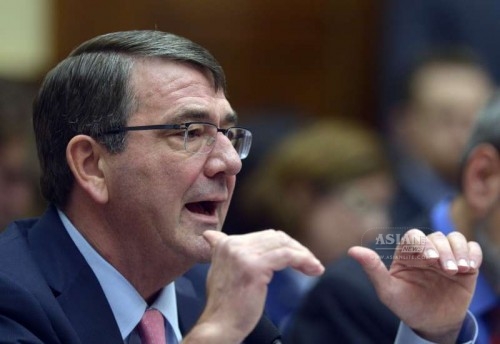
By Arun Kumar
Calling India a ‘critical ally’, two influential US senators have asked the new Defence Secretary Ashton Carter to place a special emphasis on deepening the US-India defence relationship.
“The US strategic partnership with India is among our nation’s most important,” wrote Republican John Cornyn and Democrat Mark Warner, co-chairs of bipartisan Senate India Caucus, in a joint letter to Carter.
The US “has a broad array of strategic interests in the region, from the long-term security and stability of Afghanistan to our strategic pivot to the Asia-Pacific,” they wrote.
“Our partnership with India is critical as we focus on strengthening America’s long-term role in the region.”
“As you consider a wide range of important strategic and defence issues during your tenure as Secretary, we ask that you place a special emphasis on India as a critical ally.”
“We believe that focusing on cultivating India as a strategic ally now will pay great dividends for both nations over the long run,” wrote Cornyn and Warner.
They expressed “our strong support” for the US-India defence relationship, as well as the commitments made by the Obama Administration to enhance the strategic partnership with India during President Barack Obama’s January visit to India.
“The renewal of the ten-year framework for the US-India defence relationship is an important component to help solidify these strategic interests,” Cornyn and Warner wrote.
Former Defence Secretary Chuck Hagel, they wrote “correctly recognized that this renewal “signal[s] a new depth and sophistication in our defence and security cooperation, ensuring that it continues to be one of the strongest pillars of our nations’ broad strategic partnership – a partnership that will help forge security and stability in Asia and across the globe.”
“The results of our defence partnership have already proved fruitful,” Cornyn and Warner wrote noting “the US and India have cooperated in countering terrorism, combating the proliferation of weapons of mass destruction, and bolstering the security of the region.”
Over $10 billion dollars in defence trade deals between the US and India have been signed since 2008, and the two counties now conduct more military exercises with each other than with any other country, they noted.
Cornyn and Warner also welcomed India’s initial steps toward liberalising its foreign direct investment rules in the defence sector, which will allow for greater investments by US companies, as well as both countries’ renewed emphasis on the Defence Technology and Trade Initiative (DTTI).
Carter, they noted, had helped conceptualise DTTI in his previous capacity as Deputy Defence Secretary, to advance technological cooperation, co-production and co-development efforts with India.
The senators wrote they also “remain hopeful that India will make needed reforms in defence offsets, since the current system is difficult to navigate and is often a roadblock to foreign investment.”
“It would be beneficial to pursue a two-tiered system where offset funds that cannot be spent on traditional Indian defence industries could flow to a second tier of other Indian priorities such as education, skills development, or manufacturing,” they suggested.
Carter, they recalled had written in November 2013 that “there are few accomplishments of which I am more proud than what the Department of Defence has achieved with India.”
The senators said they looked forward to working with Carter “to build on these achievements and deepen our strategic bilateral and defence partnership with our key ally in South Asia.”
“As we deepen our engagement in the Asia-Pacific region, so must we deepen our partnership with India,” they wrote.